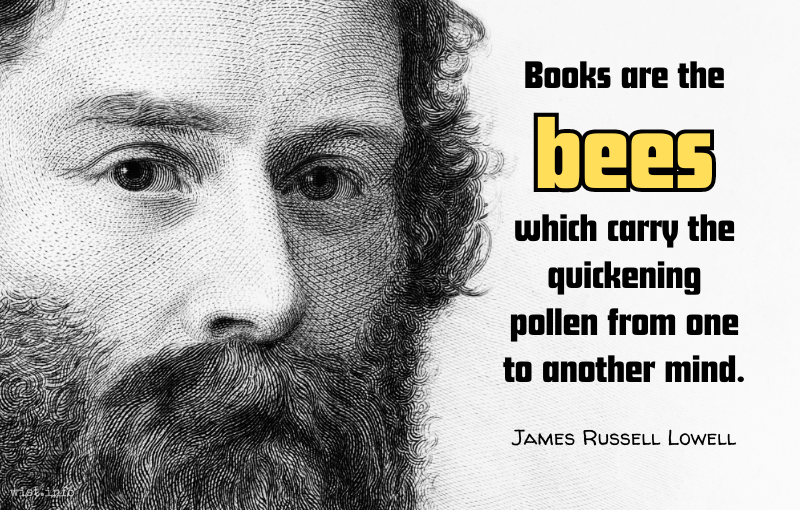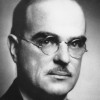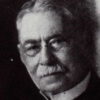Courage can’t see around corners but goes around them anyway.
Mignon McLaughlin (1913-1983) American journalist and author
The Neurotic’s Notebook, ch. 4 (1963)
(Source)
My days of love are over; me no more
The charms of maid, wife, and still less of widow,
Can make the fool of which they made before, —
In short, I must not lead the life I did do;
The credulous hope of mutual minds is o’er,
The copious use of claret is forbid too,
So for a good old-gentlemanly vice,
I think I must take up with avarice.
HARRIS: I call it performance art, but my friend Ariel calls it wasting time. History will decide.
Steve Martin (b. 1945) American comedian, actor, writer, producer, musician
L. A. Story (1991)
(Source)
That’s metaphysics, my dear fellow. It’s forbidden by my doctors, my stomach won’t take it.
Boris Pasternak (1890-1960) Russian poet, novelist, and literary translator
Doctor Zhivago [До́ктор Жива́го], Part 1, ch. 1 “The Five O’Clock Express,” sec. 5 [Ivan Ivanovich] (1955) [tr. Hayward & Harari (1958), US ed.]
(Source)
After a long argument by Voskoboinikov to avowed atheist Ivanovich as to the necessity of Christianity and the Gospels.
Alternate translations:
That’s metaphysics, my dear fellow. It's forbidden me by my doctors, my stomach won’t take it.
[tr. Hayward & Harari (1958), UK ed.]
Metaphysics, old boy. It's forbidden me by my doctors; my stomach can't digest it.
[tr. Pevear & Volokhonsky (2010)]
Nothing more clearly shows how little God esteems his gift to men of wealth, money, position and other worldly goods, than the way he distributes these, and the sort of men who are most amply provided with them.
[Rien ne fait mieux comprendre le peu de chose que Dieu croit donner aux hommes, en leur abandonnant les richesses, l’argent, les grands établissements et les autres biens, que la dispensation qu’il en fait, et le genre d’hommes qui en sont le mieux pourvus.]
Jean de La Bruyère (1645-1696) French essayist, moralist
The Characters [Les Caractères], ch. 6 “Of Gifts of Fortune [Des Biens de Fortune],” § 24 (6.24) (1688) [tr. Stewart (1970)]
(Source)
See Alexander Pope.
(Source (French)). Alternate translations:
Nothing makes us better comprehend what little things God thinks he bestows on Mankind, when he suffers 'em to abound in Riches, Gold, Settlements, Stations, and other advantages, than the dispensations he makes of them, and the sort of men who are best provided.
[Bullord ed. (1696)]
Nothing makes us better comprehend what little things God thinks he bestows on Mankind, in suffering 'em to abound in Riches, Mony, great Preferments, and other Advantages, than the Distribution he makes of 'em, and the sort of Men who are best provided.
[Curll ed. (1713)]
Nothing makes us better understand what trifling things Providence thinks He bestows on men in granting them wealth, money, dignities, and other advantages, than the manner in which they are distributed and the kind of men who have the largest share.
[tr. Van Laun (1885)]
Anyone who has achieved excellence in any form knows that it comes as a result of ceaseless concentration. Paying attention.
Louise "Lulu" Brooks (1906-1985) American film actress, dancer, writer
Lulu in Hollywood, ch. 5 “The Other Face of W. C. Fields” (1982)
(Source)
Writing of Mack Sennett.
A bad beginning makes a bad ending.
[κακῆς <ἀπ'> ἀρχῆς γίγνεται τέλος κακόν]
Euripides (485?-406? BC) Greek tragic dramatist
Æolus [Αἴολος], frag. 32 (TGF)
(Source)
Nauck frag. 32. (Source (Greek)). Alternate translation:
A bad ending comes from a bad beginning.
[tr. Collard & Cropp (2008)]
Designing a dream city is easy; rebuilding a living one takes imagination.
Jane Jacobs (1916-2006) American-Canadian journalist, author, urban theorist, activist
“Downtown Is for People,” Fortune (1958-04)
(Source)
Closing words of the essay.
Originally reprinted in the magazine's topical collection, The Exploding Metropolis (1958). Later collected in Samuel Zipp and Nathan Storring, eds., Vital Little Plans: The Short Works of Jane Jacobs (2016).
Contented, unambitious people are all very well in their way. They form a neat, useful background for great portraits to be painted against, and they make a respectable, if not particularly intelligent, audience for the active spirits of the age to play before.
Jerome K. Jerome (1859-1927) English writer, humorist [Jerome Klapka Jerome]
Idle Thoughts of an Idle Fellow, “On Getting On in the World” (1886)
(Source)
FRIAR: For it so falls out
That what we have we prize not to the worth,
Whiles we enjoy it, but being lacked and lost,
Why then we rack the value, then we find
The virtue that possession would not show us
Whiles it was ours.William Shakespeare (1564-1616) English dramatist and poet
Much Ado About Nothing, Act 4, sc. 1, l. 228ff (4.1.228-233) (1598)
(Source)
Books are the bees which carry the quickening pollen from one to another mind.
James Russell Lowell (1819-1891) American diplomat, essayist, poet
“Nationality in Literature,” North American Review, Article 10 (1849-07)
(Source)
Reviewing Henry Wadsworth Longfellow, Kavanagh (1849).
Life was given me as a favour; I may consequently give it back, when it is no longer so.
[La vie m’a été donnée comme une faveur ; je puis donc la rendre lorsqu’elle ne l’est plus.]
Charles-Lewis de Secondat, Baron de Montesquieu (1689-1755) French political philosopher
Persian Letters [Lettres Persanes], Letter 76, Usbek to Ibben (1721) [tr. Ozell (1760 ed.), No. 77]
(Source)
(Source (French)). Alternate translations:
Life was given to me as a favour; I may then return it, when it is no more so.
[tr. Floyd (1762)]
Life was given me as a blessing; when it ceases to be so I can give it up.
[tr. Davidson (1891)]
Life was bestowed upon me as a favor; I may then give it back when it is a favor no longer.
[tr. Betts (1897)]
Life has been given to me as a favor, which I can return when it is that no longer.
[tr. Healy (1964)]
Life was given to me as a kind of favor; when it ceases to be that, I can put an end to it.
[tr. MacKenzie (2014)]
By diligence and patience, the mouse bit in two the cable.
Benjamin Franklin (1706-1790) American statesman, scientist, philosopher, aphorist
Poor Richard (1735 ed.)
(Source)
Duty is weightier than a mountain, while death is lighter than a feather.
Meiji (1852-1912) Emperor of Japan (1867-1912) [明治天皇, Meiji-tennō; b. Mutsuhito (睦仁)]
“Imperial Rescript to Soldiers and Sailors [軍人勅諭, Gunjin Chokuyu]” (1882-01-04)
(Source)
The Rescript was the official code of ethics for military personnel, foundational to the Imperial Japanese armed forces and much of Japanese society. Officially issued by the Emperor Meiji, but actually written by oligarchs Inoue Kowashi and Yamagata Aritomo with editing by journalist Fukuchi Gen'ichiro.
Japanese source. More information on the Rescript.
The charge is often made against etiquette that it is artificial. Yes, indeed, it is. Civilization is artificial. When people extoll the virtues of naturalness, honesty, informality, intimacy, and creativity — watch out. Honesty has come to mean the privilege of insulting you to your face without expecting redress, and creativity that it is wrong to interfere with a child who is destroying your possessions. It is apparently natural behavior to treat the sick, the disabled, and the bereaved with curiosity and distaste, but it is also highly uncivilized.
Judith Martin (b. 1938) American author, journalist, etiquette expert [a.k.a. Miss Manners]
Common Courtesy, “In the Quest for Equality, Civilization Itself Is Maligned” (1985)
(Source)
Originally published in The New Republic in 1984.
Primitiveness and civilization are degrees of the same thing. If civilization has an opposite, it is war. Of these two things, you have either one, or the other. Not both.
The glory of the One Who moves all things
shines through the universe and is reflected
by all things in proportion to their merit.[La gloria di colui che tutto move
per l’universo penetra, e risplende
in una parte più e meno altrove.]Dante Alighieri (1265-1321) Italian poet
The Divine Comedy [Divina Commedia], Book 3 “Paradiso,” Canto 1, l. 1ff (1.1-3) (1320) [tr. Musa (1984)
(Source)
God as the "unmoved mover" derives from Aristotle (Metaphysics 12.7), frequently referenced in medieval Scholastic writings.
Musa provides this variant translation as "a more interpretive rendering" in his notes (and a rendering similar to Ciardi's). His more literal translation, which he uses in the main text, is given below.
(Source (Italian)). Alternate translations:
His Glory, who, with solitary hand,
Launches thro' boundless space the stellar Band,
And shines effulgent, or involves his Throne
In darkness, as he wills ....
[tr. Boyd (1802), st. 1]
His glory, by whose might all things are mov’d,
Pierces the universe, and in one part
Sheds more resplendence, elsewhere less.
[tr. Cary (1814)]
The glory of Him who moveth all things
Pierceth the universe, and shines so fair,
More at one part, and less, perchance, elsewhere.
[tr. Bannerman (1850)]
The glory of Him who moveth everything
Doth penetrate the universe, and shine
In one part more and in another less.
[tr. Longfellow (1867)]
The glory of Him who moves all things penetrates through the universe, and shines forth in one quarter more, and less in another.
[tr. Butler (1885)]
His glory who moves all doth penetrate
Throughout the universe, and shineth bright
Here with a greater, there with lesser state.
[tr. Minchin (1885)]
The glory of Him who moves everything penetrates through the universe, and shines in one part more and in another less.
[tr. Norton (1892)]
The All-mover's glory penetrates through the universe, and regloweth in one region more, and less in another.
[tr. Wicksteed (1899)]
The glory of Him who moves all things penetrates the universe and shines in one part more and in another less.
[tr. Sinclair (1939)]
The glory of Him who moveth all that is
Pervades the universe, and glows more bright
In the one region, and in another less.
[tr. Binyon (1943)]
The glory of Him who moves all things soe’er
Impenetrates the universe, and bright
The splendour burns, more here and lesser there.
[tr. Sayers/Reynolds (1962)]
The glory of Him who moves all things rays forth
through all the universe, and is reflected
from each thing in proportion to its worth.
[tr. Ciardi (1970)]
The glory of the All-Mover penetrates through the universe and reglows in one part more, and in another less.
[tr. Singleton (1975)]
The glory of him who moves everything
Penetrates the universe and shines
In one part more and, in another, less.
[tr. Sisson (1981)]
the glory of the One who moves all things
permeates the universe and glows
in one part more and in another less.
[tr. Mandelbaum (1984)]
The glory of the One Who moves all things
penetrates all the universe and shines
in one part more and in another less.
[tr. Musa (1984)]
The glory of Him who moves all things
penetrates through the universe and shines
forth in one place more and less elsewhere
[tr. Durling (2011)]
The glory of Him, who moves all things, penetrates the universe, and glows in one region more, in another less.
[tr. Kline (2002)]
Glory, from Him who moves all things that are,
penetrates the universe and then shines back,
reflected more in one part, less elsewhere.
[tr. Kirkpatrick (2007)]
The glory of Him who moves all things
pervades the universe and shines
in one part more and in another less.
[tr. Hollander/Hollander (2007)]
The Glory of He who made and moves it all
Penetrates the entire universe
Glowing in one part more, in another less.
[tr. Raffel (2010)]
The glory of the Animator of Everything
Pervades the universe and shines more
In one area and less somewhere else.
[tr. Bang (2021)]
What we do is never understood but always only praised or censured.
[Was wir thun, wird nie verstanden, sondern immer nur gelobt und getadelt.]
Friedrich Nietzsche (1844-1900) German philosopher and poet
The Gay Science [Die fröhliche Wissenschaft], Book 3, § 264 (1882) [tr. Kaufmann (1974)]
(Source)
Also known as La Gaya Scienza, The Joyful Wisdom, or The Joyous Science.
(Source (German)). Alternate translations:
What we do is never understood, but only praised and blamed.
[tr. Common (1911)]
What we do is never understood but always merely praised and reproached.
[tr. Nauckhoff (2001)]
LAZARUS: You’re so sentimental, Doctor. Maybe you are older than you look.
THE DOCTOR: I’m old enough to know that a longer life isn’t always a better one. In the end, you just get tired; tired of the struggle, tired of losing everyone that matters to you, tired of watching everything you love turn to dust. If you live long enough, Lazarus, the only certainty left is that you’ll end up alone.
LAZARUS: That’s a price worth paying.
THE DOCTOR: Is it?
Stephen Greenhorn (b. 1964) Scottish playwright and screenwriter
Doctor Who, (2005) 03×06 “The Lazarus Experiment” (2007-05-05)
(Source)
Life is a flame that is always burning itself out; but it catches fire again every time a child is born.
George Bernard Shaw (1856-1950) British playwright and critic
“The Adventures of the Black Girl in Her Search for God,” Short Stories, Scraps, and Shavings (1932)
(Source)
He that has a secret should not only hide it, but hide that he has it to hide.
Thomas Carlyle (1795-1881) Scottish essayist and historian
The French Revolution: A History, Part 2, Book 1, ch. 7 (2.1.7) (1837)
(Source)
Carlyle puts this in quotes, but he is again apparently quoting himself. He later used the phrase in his history of Friedrich II of Prussia (Frederick the Great).
What a contrast to this civil war in our midst! Here, set deep inside the country, are conspiracy, danger and a deadly foe. Degeneracy, madness and evil are the enemies we have to fight.
[Domesticum bellum manet, intus insidiae sunt, intus inclusum periculum est, intus est hostis. cum luxuria nobis, cum amentia, cum scelere certandum est.]
Marcus Tullius Cicero (106-43 BC) Roman orator, statesman, philosopher
Orationes in Catilinam [Catilinarian Orations], No. 2, ch. 5 / § 11 (2.5.11) (63-11-09 BC) [tr. Grant (1960)]
(Source)
Cicero argues that, having achieved peace with other nations, the danger to Rome is now the internal one of Catiline and his decadent, wastrel followers.
(Source (Latin)). Alternate translations:
The Plot is within; the danger locked within; the Enemy is within: We have a Conflict with Luxury, with Madness, with Treachery.
[tr. Wase (1671)]
Our only danger is at home; treason lurks within our walls; the enemy is in the heart of the city. Luxury, villainy, and madness, are the foes we are to encounter.
[tr. Sydney (1795)]
Domestic war alone remains. The only plots against us are within our own walls, -- the danger is within, -- the enemy is within. We must war with luxury, with madness, with wickedness.
[tr. Yonge (1856)]
A war at home remains; the snares are within; the danger is inclosed within; the enemy is within; we have to contend with luxury, with madness, with guilt.
[tr. Mongan (1879)]
A domestic war remains; the snares are within; the danger is inclosed within; the enemy is within; it is to be contended to (by) us with luxury, with madness, with crime.
[tr. Underwood (1885)]
A domestic war remains; the ambuscades are within; the danger is enclosed within; the enemy is within; (it) is to [must] be contended by us [we must contend] with luxury, with madness, with crime.
[tr. Dewey (1916)]
The enemy is within the gates; it is with our own luxury, our own folly, our own criminality that we have to contend.
[tr. Taylor (1916)]
You mean, apart from my own?
Zsa Zsa Gabor (1917-2016) Hungarian-American actress, socialite [b. Sári Gábor]
(Attributed)
When asked by an interviewer how many husbands she had had.
Widely attributed to Gabor. The earliest reference I can find is in Kenneth Edwards, I Wish I’d Said That! (1976).
A hypothesis which permits the prediction of certain effects that always reoccur under certain conditions does, in its way amount to a demonstrable certainty. Even the Newtonian system had no more than such a foundation.
[Une hypothèse qui permet de prévoir certains effets qui se reproduisent toujours ressemble absolument à une vérité démontrée. Le système de Newton ne repose guère sur un autre fondement. Si en réalité et de l aveu du.]
Alexis de Tocqueville (1805-1859) French writer, diplomat, politician
Letter to De Gobineau (1858-08-05)
(Source)
You’ll dine well, dear Fabullus, in my lodging
one day soon — if the gods look on you kindly,
if you bring along a good and lavish
dinner, not to mention an attractive
girl, plus wine and salt and witty stories.
If, I repeat, you bring this lot, old sweetheart,
you’ll dine well. The thing is, your Catullus
has a purse that’s full — of spiders’ cobwebs.[Cenabis bene, mi Fabulle, apud me
paucis, si tibi di favent, diebus,
si tecum attuleris bonam atque magnam
cenam, non sine candida puella
et vino et sale et omnibus cachinnis.
haec si, inquam, attuleris, venuste noster
cenabis bene; nam tui Catulli
plenus sacculus est aranearum.]Catullus (c. 84 BC – c. 54 BC) Latin poet [Gaius Valerius Catullus]
Carmina # 13 “To Fabullus,” ll. 1-8 [tr. Green (2005)]
(Source)
(Source (Latin)). Alternate translations:
Fabullus, if the gods agree,
So mightily to favour thee;
Thou shalt, ere many days be spent,
Sup with me to thy heart's content:
But do thyself provide the treat,
Of which we sumptuously may eat;
Bring thy fair mistress, bring thy wine,
Loud laughter, and each jest of thine;
Let these, my merry soul, be sent;
Then sup unto thy heart's content:
For thy poor poet's purse with nought
But spider's worthless webs is fraught.
[tr. Nott (1795)]
Fabullus, thou shalt be my guest
At supper soon, if Heaven's behest
No otherwise decree:
The feast too must be rich and rare,
And since though lov'st luxurious fare,
Bring such a feast with thee.
And bring the girl with breast of snow,
And wine and wit of ready flow,
And laughter's joyous peal;
Bid but all these my board attend,
And then no doubt, my gallant friend,
We'll have a glorious meal.
For in my coffers spiders weave
Their webs in peace ....
[tr. Lamb (1821)]
You dine with me, Fabullus mine,
On Friday next, at half-past two;
And I can promise that you'll dine
As well as man need wish to do;
If you bring with you, when you come,
A dinner of the very best,
And lots of wine and mirth , and some
Fair girl to give the whole a zest.
'Tis if you bring these -- mark me now!
That you're to have the best of dinners;
For your Catullus' purse, I vow,
Has nothing in't but long-legg'd spinners.
[tr. T. Martin (1861)]
If the gods will, Fabullus mine,
With me right heartily you'll dine,
Bring but good cheer -- that chance is thine
Some days hereafter;
Mind a fair girl, too, wit, and wine,
And merry laughter.
Bring these -- you'll feast on kingly fare --
But bring them -- for my purse -- I swear
The spiders have been weaving there.
[tr. Cranstoun (1867)]
Please kind heaven, in happy time, Fabullus,
We'll dine merrily, dear my friend, together.
Promise only to bring, your own, a dinner
Rich and goodly; withal a lily maiden,
Wine, and banter, a world of hearty laughing.
Promise only; betimes we dine, my gentle
Friend, most merrily; but, for your Catullus --
Know he boasts but a pouch of empty cobwebs.
[tr. Ellis (1871)]
Thou'lt sup right well with me, Fabullus mine,
In days few-numbered an the Gods design,
An great and goodly meal thou bring wi' thee
Nowise forgetting damsel bright o' blee,
With wine, and salty wit and laughs all-gay.
An these my bonny man, thou bring, I say
Thou'lt sup right well, for thy Catullus' purse
Save web of spider nothing does imburse.
[tr. Burton (1893)]
You will feast well with me, my Fabullus, in a few days, if the gods favour you, provided you bring here with you a good and great feast, not forgetting a radiant girl and wine and wit and all kinds of laughter. Provided, I say, you bring them here, our charming friend, you will feast well: for your Catullus' purse is full with cobwebs.
[tr. Smithers (1894)]
You shall have a good dinner at my house, Fabullus, in a few days, please the gods, if you bring with you a good dinner and plenty of it, not forgetting a pretty girl and wine and wit and all5 kinds of laughter. If, I say, you bring all this, my charming friend, you shall have a good dinner; for your Catullus' purse is full of cobwebs.
[tr. Warre Cornish (1904)]
Fabullus, the Gods so willing, you shall feast with me in luxury, a few days hence, if you will bring with you dishes both delicate and varied, a comely maid, wine, wit, and a store of quips and cranks. Bring all these, my dear friend, and you shall sup luxuriously; for the purse of your Catullus is full of cobwebs.
[tr. Stuttaford (1912)]
Come dine with me, Fabullus, do.
You shall dine well, I promise you.
If Fates are kind, and if you bring
Along with you the needful thing --
A dinner bountiful and fine,
A pretty girl, new salt, old wine,
And topping all a hearty laugh,
Mirth, jest, and wit and friendly chaff --
If these you bring, old friend, I swear.
That you shall dine on royal fare.
Catullus' purse is full -- but hold!
Of musty cobwebs -- now don't scold ....
[tr. Stewart (1915)]
Right well, Fabullus, you shall sup with me
If the Gods love you, at an early date,
If you bring ample fare and delicate,
A damsel too , if she be nice to see;
Bring wine and spice and laughs and gaiety;
Bring these and you will sup with me in state.
For my poor little purse, I tell you straight
Is stuffed with cobwebs, full as full can be.
[tr. Symons-Jeune (1923)]
Soon, if all's well, Fabullus mine,
You at my house shall nobly dine,
If you the noble meal provide,
Yes, and a lovely girl beside,
And wine and wit and mirth sans end.
If these you bring, my charming friend,
You shall dine nobly; cobwebs fill
The purse of your Catullus. Still ....
[tr. MacNaghten (1925)]
Within a week, dear friend, (D.V.)
You shall be dining well with me;
That is, if you yourself provide
The dinner and the wine beside,
And with some jokes to salt our food
A damsel of complaisant mood.
If these you bring, then, as I say,
We'll have a jolly feast that day.
For I must tell you that my purse
Is full -- and there is nothing worse
Of cobwebs, and it does not hold
The smallest particle of gold.
[tr. Wright (1926);
"Deus Volunt" = "God Willing"]
Come, my Fabullus, there's a grand dinner waiting
for you at my house tomorrow, or the next day,
or the next, or a few days after --
that is, if gods are kind and you bring a banquet with you:
don't forget a round of wine and
a bright-eyed, sparkling girl and
your wit and every known variety of laughter.
Bring these, my dear, and you
shall have a glorious dinner;
your Catullus (see his purse)
has nothing left but cobwebs.
[tr. Gregory (1931)]
Fabullus, you'll have quite a feast
At my place in a day or two --
If the gods decide to favor you,
If you provide the meal, at least.
Then bring a glowing girl, and lend
Some wine, some wit, a laugh that rings.
If you remember all these things,
You'll have a feast, my charming friend --
For your Catullus' money-sack
is full of spiders, nothing more.
[tr. Hollander (1976)]
You will dine well with me, my dear Fabullus,
in a few days or so, the gods permitting.
Provided you provide the many-splendored
feast and invite your fair-complected lady,
your wine, your salt, and all the entertainment!
Which is to say, my dear, if you bring dinner
you will dine well, for these days your Catullus
fines that his purse is only full of cobwebs.
[tr. C. Martin (1979)]
You’ll dine well, in a few days, with me,
if the gods are kind to you, my dear Fabullus,
and if you bring lots of good food with you,
and don’t come without a pretty girl
and wine and wit and all your laughter.
I say you’ll dine well, and charmingly,
if you bring all that: since your Catullus’s
purse alas is full of cobwebs.
[tr. Kline (2001)]
You’ll dine well at my house, Fabullus
In a few days, if the gods favor you, and
If you bring a fine, large meal with you.
And don’t forget: a bright-eyed girl,
Wine, salt, and every kind of cheer.
If you bring these things I ask, fine friend,
You will dine well: for your Catullus’ wallet
Is full of nothing but spider webs.
[tr. @sentantiq (2015)]
You will dine well, my Fabullus, at my house
in a few days (if the gods favor you),
and if you bring with you a nice big
dinner, not without a pretty girl
and wine and wit and laughs for everyone
I say: if you bring these, my charming one,
you will dine well -- for the little purse
of your Catullus is full of cobwebs.
[tr. Wikibooks (2017)]
You will dine well, my (dear) Fabullus, at my house
in a few days, if the gods favor you,
and if you bring with you a large and good dinner,
not without a bright girl
and wine and salt[/wit] and laughter for all.
If you bring these, I say, our charming one,
you will dine well -- for your Catullus's
purse is full of cobwebs.
[tr. Wikisource (2018)]
However that may be, it is always disastrous when governments set to work to uphold opinions for their utility rather than for their truth. As soon as this is done it becomes necessary to have a censorship to suppress adverse arguments, and it is thought wise to discourage thinking among the young for fear of encouraging “dangerous thoughts.” When such mal-practices are employed against religion as they are in Soviet Russia, the theologians can see that they are bad, but they are still bad when employed in defence of what the theologians think good. Freedom of thought and the habit of giving weight to evidence are matters of far greater moral import than the belief in this or that theological dogma. On all these grounds it cannot be maintained that theological beliefs should be upheld for their usefulness without regard to their truth.
Bertrand Russell (1872-1970) English mathematician and philosopher
“Is There a God?” (1952)
(Source)
Essay commissioned by Illustrated magazine in 1952, but never published there. First publication in Russell, Last Philosophical Testament, 1943-68 (1997) [ed. Slater/Köllner].
We must try to keep the mind in tranquility. For just as the eye which constantly shifts its gaze, now turning to the right or to the left, now incessantly peering up and down, cannot see distinctly what lies before it, but the sight must be fixed firmly on the object in view if one would make his vision of it clear, so too man’s mind when distracted by his countless worldly cares cannot focus itself distinctly on the truth.
Basil of Caesarea (AD 330-378) Christian bishop, theologian, monasticist, Doctor of the Church [Saint Basil the Great, Ἅγιος Βασίλειος ὁ Μέγας]
Letter to Gregory of Nazianzus (c. AD 358) [tr. Defarrari (1926)]
(Source)
Since Joys are so uncertain; take Gladness when it comes.
Thomas Fuller (1654-1734) English physician, preacher, aphorist, writer
Introductio ad Prudentiam, Vol. 1, # 101 (1725)
(Source)
Even when freshly washed and relieved of all obvious confections, children tend to be sticky.
Fran Lebowitz (b. 1950) American journalist
“Children: Pro or Con,” Metropolitan Life (1978)
(Source)
Hope, like faith, is nothing if it is not courageous; it is nothing if it is not ridiculous.
An old racetrack joke reminds you that your program contains all the winners’ names. I stare at my typewriter keys with the same thought.
Mignon McLaughlin (1913-1983) American journalist and author
The Neurotic’s Notebook, ch. 5 (1963)
(Source)
What men call gallantry, and gods adultery,
Is much more common where the climate’s sultry.
Of course one does meet brilliant men, but they are isolated. The fashion nowadays is all for groups and societies of every sort. — It is always a sign of mediocrity in people when they herd together, whether their group loyalty is to Solovyev or to Kant or Marx. The truth is only sought by individuals, and they break with those who do not love it enough.
Boris Pasternak (1890-1960) Russian poet, novelist, and literary translator
Doctor Zhivago [До́ктор Жива́го], Part 1, ch. 1 “The Five-O’Clock Express,” sec. 4 [Nikolai Nikolaievich] (1955) [tr. Hayward & Harari (1958), UK ed.]
(Source)
Alternate translations:
Yes, there are gifted men, but the fashion nowadays is all for groups and societies of every sort. Gregariousness is always the refuge of mediocrities, whether they swear by Solovyiëv or Kant or Marx. Only individuals seek the truth, and they shun those whose sole concern is not the truth.
[tr. Hayward & Harari (1958), US ed.]
You come across talented people. But now various circles and associations are the fashion. Every herd is a refuge for giftlessness, whether it's a faith in Soloviev, or Kant, or Marx. Only the solitary seek the truth, and they break with all those who don't love it sufficiently.
[tr. Pevear & Volokhonsky (2010)]
And to await a pleasure, is itself a pleasure.
[Und ein Vergnügen erwarten, ist auch ein Vergnügen.]Gotthold Lessing (1729-1781) German playwright, philosopher, dramaturg, writer
Minna von Barnhelm, Act 4, sc. 6 [Minna] (1763) [tr. Holroyd/Bell (1888)]
(Source)
A man is rich whose income is larger than his expenses, and he is poor if his expenses are greater than his income.
[Celui-là est riche, qui reçoit plus qu’il ne consume; celui-là est pauvre, dont la dépense excède la recette.]Nicolas Chamfort (1741-1794) French writer, epigrammist (b. Nicolas-Sébastien Roch)
The Characters [Les Caractères], ch. 6 “Of Gifts of Fortune [Des Biens de Fortune],” § 49 (6.49) (1688) [tr. Van Laun (1885)]
(Source)
(Source (French)). Alternate translations:
He is rich whose Receipt is more than his Expences, and he is poor whose Expences are more than his Receipt.
[Bullord ed. (1696)]
He is rich, whose Income is more than his Expences; and he is poor whose Expences are more than his Income.
[Curll ed. (1713)]
He is rich, whose Income is more than his Expences; and he is poor whose Expences exceed his Income.
[Browne ed. (1752)]
That man is rich, who gets more than he spends; that man is poor, whose expenses exceed his receipts.
[tr. Stewart (1970)]
If I wanted to write, I had to be willing to develop a kind of concentration found mostly in people awaiting execution.
EDIBLE, adj. Good to eat, and wholesome to digest, as a worm to a toad, a toad to a snake, a snake to a pig, a pig to a man, and a man to a worm.
Ambrose Bierce (1842-1914?) American writer and journalist
“Edible,” The Cynic’s Word Book (1906)
(Source)
Included in The Devil's Dictionary (1911). Originally published in the "Devil's Dictionary" column in the San Francisco Wasp (1882-12-23).
Full many various qualities distinguish
The Cyprian Goddess; both supreme delight
And sorrow she dispenses to mankind:
O may I meet with her when most propitious.
[Τῇ δ’ ‘ Αφροδίτῃ πόλλ’ ἔνεστι ποικίλα ·
τέρπει τε γὰρ μάλιστα καὶ λυπεῖ βροτούς ·
τύχοιμι δ’ αὐτῆς, ἡνίκ ̓ ἐστὶν εὐμενής .]Euripides (485?-406? BC) Greek tragic dramatist
Æolus [Αἴολος], frag. 26 (TGF) [tr. Wodhull (1809)]
(Source)
The Cyprian Goddess is Aphrodite, the goddess of love.
Nauck frag. 26, Barnes frag. 34, Musgrave frag. 10. (Source (Greek)). Alternate translations:
Aphrodite has many shades:
She can please or aggrieve men completely.
[tr. @sentantiq (2015)]
Many of us affect a tone of irony about gadgets, as if we lived always in realms above and dealt with trifles only during rare descents from sublime thoughts. The truth is that more and more of the important things in life turn on pinpoints. Our frustrations begin in trivialities — a telephone out of order, a car that will not start, a claim check whose number has been misread. The thing in cellophane that cannot be got at — plain to the sight but sealed like an egg — is the modern version of the torture of Tantalus. Catastrophes we will deal with like heroes, but the bottle top that defies us saps our morale, like the tiny arrows of the Lilliputians that maddened Gulliver and set his strength at naught.
Jacques Barzun (1907-2012) French-American historian, educator, polymath
God’s Country and Mine, Part 3, ch. 12 (1954)
(Source)
I have learned yet again (this has been going on all my life) what folly it is to take anything for granted without examining it skeptically.
Joseph Jacobs (1854-1916) Australian folklorist, literary critic, historian writer
Dark Age Ahead, “Notes and Comments” (2004)
(Source)
For tho’ I know he loves me,
To-night my heart is sad;
His kiss was not so wonderful
As all the dreams I had.Sara Teasdale (1884-1933) American lyrical poet
“The Kiss,” Helen of Troy and Other Poems (1911)
(Source)
CLAUDIO: O, what authority and show of truth
Can cunning sin cover itself withal!William Shakespeare (1564-1616) English dramatist and poet
Much Ado About Nothing, Act 4, sc. 1, l. 35ff (4.1.35-36) (1598)
(Source)
SEMPRONIUS: Oh! think what anxious moments pass between
The birth of plots, and their last fatal periods,
Oh! ’tis a dreadful interval of time,
Filled up with horror all, and big with death!
Destruction hangs on every word we speak,
On every thought, till the concluding stroke
Determines all, and closes our design.Joseph Addison (1672-1719) English essayist, poet, statesman
Cato, Act 1, sc. 3, l. 50ff (1713)
(Source)
Be temperate in wine, in eating, girls, and sloth;
Or the Gout will seize you and plague you both.Benjamin Franklin (1706-1790) American statesman, scientist, philosopher, aphorist
Poor Richard (1734 ed.)
(Source)
It is better to die well than to live ill. […] He who fears death loses the joy of life. Above all else truth triumphs. He conquers who dies because no adversity can hurt the one over whom iniquity holds not sway.
[Melius est bene mori, quam male vivere […] Qui mortem metuit, amittit gaudia vitae; super omnia vincit veritas, vincit, qui occiditur, quia nulla ei nocet adversitas, si nulla ei dominatur iniquitas.]
Jan Hus (c. 1370-1415) Czech priest, theologian, philosopher, Church reformer [John Huss, etc.]
Letter to Christian of Prachaticz (>1413-04) [tr. Schaff (1915)]
(Source)
Written while in exile from Prague. "Truth triumphs" was adopted as a motto by Hussite fighters, and is inscribed (in Czech, "Pravda vítězí") the banner of the President of the Czechia.
(Source (Latin)). Alternate translation:
It is better to die well than to live badly. [...] He that fears death, loses the joys of life. Above all else, truth is conqueror. He conquers, who is slain: for no adversity hurts him if no iniquity hath dominion over him.
[tr. Pope (1904)]
The following translation is often mis-cited to Schaff; an examination of Schaff's book shows the above translation instead. I cannot find an original for this translation.
It is better to die well, than to live wrongly [...] Who is afraid of death loses the joy of life; truth prevails all, prevails who is killed, because no adversity can harm him, who is not dominated by injustice.
The rationale that etiquette should be eschewed because it fosters inequality does not ring true in a society that openly admits to a feverish interest in the comparative status-conveying qualities of sneakers. Manners are available to all, for free.
Judith Martin (b. 1938) American author, journalist, etiquette expert [a.k.a. Miss Manners]
Common Courtesy, “On Etiquette as Language, Weapon, Custom, and Craft” (1985)
(Source)
History is a distillation of Rumour.
Thomas Carlyle (1795-1881) Scottish essayist and historian
The French Revolution: A History, Part 1, Book 7, ch. 5 (1.7.5) (1837)
(Source)
The original is actually embedded in this sentence:
Remarkable [Usher] Maillard, if fame were not an accident, and History a distillation of Rumour, how remarkable wert thou!
I came back from that holiest of waves
remade, refreshed as any new tree is,
renewed, refreshed with foliage anew,
pure and prepared to rise towards the stars.
[Io ritornai da la santissima onda
rifatto sì come piante novelle
rinovellate di novella fronda,
puro e disposto a salire a le stelle.]Dante Alighieri (1265-1321) Italian poet
The Divine Comedy [Divina Commedia], Book 2 “Purgatorio,” Canto 33, l. 142ff (33.142-146) (1314) [tr. Kirkpatrick (2007)]
(Source)
Conclusion of Dante's journey through Purgatory, his soul having been cleansed drinking the waters of the Eunoë. As with Inferno and Paradisio, Purgatorio ends on the word "stars."
(Source (Italian)). Alternate translations:
From that pure fount, with renovated pow'r
I rose, prepar'd to leave that happy Shore,
And mount among the Stars, on ardent wing.
[tr. Boyd (1802), st. 27]
I return’d
From the most holy wave, regenerate,
If ’en as new plants renew’d with foliage new,
Pure and made apt for mounting to the stars.
[tr. Cary (1814)]
Returned I from that holiest of waves
Refreshed in spirit, like the new-sprung plants,
Renewed with foliage suited to their wants,
Pure, and disposed to climb unto the stars.
[tr. Bannerman (1850)]
From the most holy water I returned
Regenerate, in the manner of new trees
That are renewed with a new foliage,
Pure and disposed to mount unto the stars.
[tr. Longfellow (1867)]
I turned back from the most holy wave refect in such wise as new plants renewed with new foliage, pure and disposed to mount up to the stars.
[tr. Butler (1885)]
I turnèd back from those most holy waves
Created fresh, as plants made new once more,
Renewèd through the birth of new green leaves,
Pure, and prepared unto the stars to soar.
[tr. Minchin (1885)]
I returned from the most holy wave, renovated as new plants renewed with new foliage, pure and disposed to mount unto the stars.
[tr. Norton (1892)]
I came back from the most holy waves, born again, even as new trees renewed with new foliage, pure and ready to mount to the stars.
[tr. Okey (1901)]
From the most holy waters I came forth again remade, even as new plants renewed with new leaves, pure and ready to mount to the stars.
[tr. Sinclair (1939)]
Back from that wave's most holy privilege
I turned me, re-made, as the plant repairs
Itself, renewed with its new foliage.
Pure and disposed to mount up to the stars.
[tr. Binyon (1943)]
From those most holy waters, born anew
I came, like trees by change of calendars
Renewed with new-sprung foliage through and through,
Pure and prepared to leap up to the stars.
[tr. Sayers (1955)]
I came back from those holiest waters new,
remade, reborn, like a sun-wakened tree
that spreads new foliage to the Spring dew
in sweetest freshness, healed of Winter's scars;
perfect, pure, and ready for the stars.
[tr. Ciardi (1961)]
I came forth from the most holy waves, renovated even as new trees renewed with new foliage, pure and ready to rise to the stars.
[tr. Singleton (1973)]
From those holiest waters I returned
to her reborn, a tree renewed, in bloom
with newborn foliage, immaculate,
eager to rise, now ready for the stars.
[tr. Musa (1981)]
I came back from that most sacred of streams,
Made afresh, as new trees are renewed
With their new foliage, and so I was
Clear and ready to go up to the stars.
[tr. Sisson (1981)]
From that most holy wave I now returned
to Beatrice; remade, as new trees are
renewed when they bring forth new boughs, I was
pure and prepared to climb unto the stars.
[tr. Mandelbaum (1982)]
I came back, from the most sacred waves, remade, as fresh plants are, refreshed, with fresh leaves: pure, and ready to climb to the stars.
[tr. Kline (2002)]
I returned from the most holy wave refreshed, as new plants are renewed with new leaves,
pure and made ready to rise to the stars.
[tr. Durling (2003)]
From those most holy waters
I came away remade, as are new plants
renewed with new-sprung leaves,
pure and prepared to rise up to the stars.
[tr. Hollander/Hollander (2007)]
Those holiest of waters returned me to life,
Recovered like new trees which quickly grow
New branches and new leaves. I'd been purified,
Ready to rise where sanctified souls can go.
[tr. Raffel (2010)]
A shrewd man has to arrange his interests in order of importance and deal with them one by one; but often our greed upsets this order and makes us run after so many things at once that through over-anxiety to have the trivial we miss the most important.
[Un habile homme doit régler le rang de ses intérêts et les conduire chacun dans son ordre. Notre avidité le trouble souvent en nous faisant courir à tant de choses à la fois que, pour désirer trop les moins importantes, on manque les plus considérables.]
François VI, duc de La Rochefoucauld (1613-1680) French epigrammatist, memoirist, noble
Réflexions ou sentences et maximes morales [Reflections; or Sentences and Moral Maxims], ¶66 (1665-1678) [tr. Tancock (1959)]
(Source)
Present in the first, 1665 edition in a slightly longer form:
Un habile homme doit savoir régler le rang de ses intérêts et les conduire chacun dans son ordre. Notre avidité le trouble souvent en nous faisant courir à tant de choses à la fois que, pour désirer trop les moins importantes, nous ne les faisons pas assez servir à obtenir les plus considérables.
(Source (French)). Alternate translations:
In this the prudent man is distinguishable from the imprudent, that he regulates his interests, and directs them to the prosecution of his designs each in their order. Our earnestness does many times raise a disturbance in them, by hurrying us after a hundred things at once. Thence it proceeds, that out of an excessive desire of the less important, we do not what is requisite for the attainment of the most considerable.
[tr. Davies (1669), ¶165]
A wise Man should order his Designs, and set all his Interests in their proper places. This Order is often disturbed by a foolish greediness, which, while it puts us upon pursuing several things at once, makes us eager for matters of less consideration; and while we grasp at trifles, we let go things of greater Value.
[tr. Stanhope (1694), ¶67]
An able man will arrange his interests, and conduct each in its proper order. Our greediness often hurts us, by making us prosecute so many things at once; by too earnestly desiring the less considerable, we lose the more important.
[pub. Donaldson (1783), ¶205; ed. Lepoittevin-Lacroix (1797), ¶65]
An able man will arrange his respective interests;, and conduct each in its proper order. Ambition is often injurious, by tempting us to prosecute too much at once. By earnestly desiring the less considerable, we lose the more important.
[ed. Carville (1835), ¶473]
A clever man should regulate his interests, and place them in proper order. Our avidity often deranges them by inducing us to undertake too many things at once; and by grasping at minor objects, we lose our hold of more important ones.
[ed. Gowens (1851), ¶67]
A clever man ought to so regulate his interests that each will fall in due order. Our greediness so often troubles us, making us run after so many things at the same time, that while we too eagerly look after the least we miss the greatest.
[tr. Bund/Friswell (1871)]
A wise man co-ordinates his interests, and develops them according to their merits. Cupidity defeats its own ends by following so many at once that in our greed for trifles we lose sight of important matters.
[tr. Heard (1917)]
A clever man will know how to range his interests, and will pursue each according to its merits. Our greed, however, will often confuse our method; for we run after so many things at once that we frequently miss what is of importance in pursuit of what is negligible.
[tr. FitzGibbon (1957)]
Clever men should arrange their desires in the proper order and seek each in turn. In our eagerness we often attempt too many things at once, and by striving too much after the small ones we lose the big.
[tr. Kronenberger (1959)]
A wise man ought to arrange his interests in their true order of importance. Our greed often disturbs this order by making us pursue so many things at once that, for too much desiring the least important, we miss those that are most so.
[tr. Whichello (2016)]
Youth is not a time of life; it is a state of mind; it is not a matter of rosy cheeks, red lips and supple knees; it is a matter of the will, a quality of the imagination, a vigor of the emotions; it is the freshness of the deep springs of life.
Youth means a temperamental predominance of courage over timidity of the appetite, for adventure over the love of ease. This often exists in a man of sixty more than a boy of twenty. Nobody grows old merely by a number of years. We grow old by deserting our ideals.
Years may wrinkle the skin, but to give up enthusiasm wrinkles the soul. Worry, fear, self-distrust bows the heart and turns the spirit back to dust.
Whether sixty or sixteen, there is in every human being’s heart the lure of wonder, the unfailing child-like appetite of what’s next, and the joy of the game of living.
When the aerials are down, and your spirit is covered with snows of cynicism and the ice of pessimism, then you are grown old, even at twenty, but as long as your aerials are up, to catch the waves of optimism, there is hope you may die young at eighty.
Samuel Ullman (1840-1924) German-American businessman, poet, humanitarian, religious leader
“Youth” (1918)
(Source)
This poem was a favorite of Douglas MacArthur, who had a copy hung in his office in Tokyo, and was responsible for much of the author's subsequent fame in Japan.
Administrivia: RSS and Email feed is kind of wonky
Apologies to those getting WIST via email or RSS. With the most recent upgrade on 17 April to WordPress 6.5.2, my RSS feed (which drives the follow.it email subscriptions) has defaulted to a “normal” feed, which loses the author information and other formatting. Unlike other instances of this (needing to replace the RSS feed modules with my customized version), it’s unclear why this is happening (the customized versions are still there). I’ll need to dig more deeply into this in my copious free time, unfortunately.
If you see a quote that seems interesting, and you want to know more (see more, see who said it, etc.) you can always click on the “title” to see the underlying WIST entry.
I’ll continue to work on this, but, yes, I’m aware it’s happening.
It iz a darned sight eazier tew find six men who kan tell exactly how a thing ought tew be did than tew find one who will do it.
[It is a darned sight easier to find six men who can tell exactly how a thing ought to be done than to find one who will do it.]
Josh Billings (1818-1885) American humorist, aphorist [pseud. of Henry Wheeler Shaw]
Everybody’s Friend, Or; Josh Billing’s Encyclopedia and Proverbial Philosophy of Wit and Humor, ch. 130 “Affurisms: Puddin & Milk” (1874)
(Source)
But if they should seek only revels and mistresses in wine and in the dice, they might be so despaired of indeed, but still they would be endurable. But who can endure this, that indolent fellows should lie in wait for the bravest men, the most foolish for the most prudent, the drunken for the sober, the sleeping for those lying awake? Who, reclining at banquets, embracing unchaste women, exhausted with wine, gorged with food, crowned with wreaths, besmeared with perfumes, debilitated by debaucheries, in their conversations belch out the slaughter of the good and the conflagrations of the city.
[Quod si in vino et alea comissationes solum et scorta quaererent, essent illi quidem desperandi, sed tamen essent ferendi: hoc vero quis ferre possit, inertis homines fortissimis viris insidiari, stultissimos prudentissimis, ebrios sobriis, dormientis vigilantibus? Qui mihi accubantes in conviviis, complexi mulieres impudicas, vino languidi, conferti cibo, sertis redimiti, unguentis obliti, debilitati stupris eructant sermonibus suis caedem bonorum atque urbis incendia.]
Marcus Tullius Cicero (106-43 BC) Roman orator, statesman, philosopher
Orationes in Catilinam [Catilinarian Orations], No. 2, ch. 5 / § 10 (2.5.10) (63-11-09 BC) [tr. Mongan (1879)]
(Source)
Excoriating the wastrel followers of Catelline.
(Source (Latin)). Alternate translations:
Now if amidst their Drinking and Gaming, they only regarded Riot and Whoring, they were indeed little hopeful, but yet tolerable. But who can endure this, that Cowards should lay wait for the Valiant, Fools for the Wise, Sots for the Sober, Sluggards for the Vigilant? That sit me at Treats with their Misses in their Laps, their Brains swimming with Wine, Stomachs over charged with Meat, Garlands on their Heads, daubed with Sweet Oyntment, weakned with Whoring, and belch out in their talk the slaughter of the honest Party and the firing of the City.
[tr. Wase (1671)]
But if debauchery and the gratification of inordinate desires had been their only object, they might still deserve some lenity; their gaming-tables, their banquets, and their harlots might be in some degree forgiven: the men, it is true, would have been lost to every virtue, but the commonwealth would have been safe. The case is now very different: that cowards should lie in ambush for the brave; that fools should lay snares for the wise and good; that sots and drunkards should plot against the sober, and sluggards combine against the vigilant; this who can bear? And it is by such despicable traitors that the city is thrown into consternation; by a set of abandoned wretches, lolling at ease on their convivial couches, caressing their strumpets, intoxicated with liquor, crowned with garlands, sweetened with perfumes, and enervated by their vicious pleasures. Men do that description take upon them to reform the state; over their cups they disgorge their treasonable designs, and in bitter execrations devote us all to destruction.
[tr. Sydney (1795)]
But if in their drinking and gambling parties they were content with feasts and harlots, they would be in a hopeless state indeed; but yet they might be endured. But who can bear this, -- that indolent men should plot against the bravest, -- drunkards against the sober, -- men asleep against men awake, -- men lying at feasts, embracing abandoned women, languid with wine, crammed with food, crowned with chaplets, reeking with ointments, worn out with lust, belch out in their discourse the murder of all good men, and the conflagration of the city?
[tr. Yonge (1856)]
But if in wine and dice they might seek only revellings and prostitutes, they would be to be despaired of indeed; but yet they would be to be borne. But who may be able to bear this, (for) inactive men to lie in wait for the bravest men, the most foolish for the most prudent, the drunken for the sober, the sleeping for the watching? Who (for me), reclining in banquets, having embraced unchaste women, languid with wine, filled with food, crowned with garlands, besmeared with perfumes, weakened with debaucheries, belch out in their discourses the slaughter of the good, and the conflagrations of the city.
[tr. Underwood (1885)]
But if in wine and dice they were seeking only street revellings and prostitutes, they must be despaired of indeed; but yet they must be endured. But who many be able to endure this, (that) idle men [fellows] to [should] lie in wait for the bravest men, the most foolish for the most prudent, the drunken for the sober, the sleeping fo the watchin? Who I say, reclining in banquets, having embraced unchaste women, sluggish with wine, crammed with food, wreathed with garlands, besmeared with perfumes, weakened with debaucheries, belch forth in their discourses the slaughter of the good, and the conflagrations of the city.
[tr. Dewey (1916)]
Now, if during their drinking and gambling bouts they merely caroused and whored, they would be hopeless enough cases, it is true, yet they could be put up with all the same. But what is unbearable is that these spiritless, stupid, drunken, somnolent brutes should be plotting to cut down citizens who are pre-eminent for their courage and wisdom and sobriety and energy. For as these individuals recline at their banquets and embrace their harlots, dazed by wine and stuffed by food, garlanded with wreathes and smothered with scents and riddled with every sort of lewdness, the vomit which issues from their mouths consists of talk about massacring every loyal citizen and burning the city to the ground.
[tr. Grant (1960)]
If in the following pages I seem to express myself dogmatically, it is only because I find it very boring to qualify every phrase with an ‘I think’ or ‘to my mind.’ Everything I say is merely an Opinion of my own. The reader can take it or leave it. If he has the patience to read what follows he will see that there is only one thing about which I am certain, and this is that there is very little about which one can be certain.
W. Somerset Maugham (1874-1965) English novelist and playwright [William Somerset Maugham]
The Summing Up, ch. 5 (1938)
(Source)













































